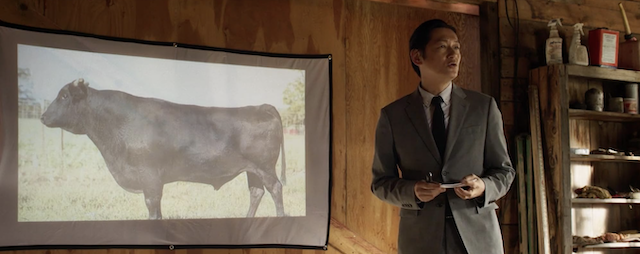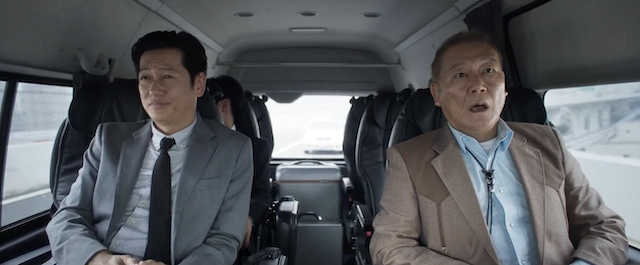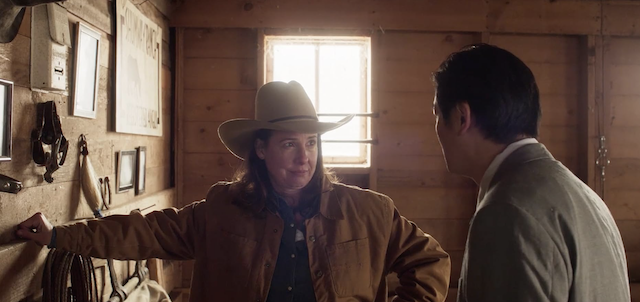
©Courtesy of Salaryman Films
Directed by Marc Marriott, Tokyo Cowboy is a charming little dramedy that follows the adventures and misadventures of Hideki, a no-nonsense Tokyo-based efficiency expert transported to Big Sky country in Montana, where he bumblingly tries to rescue a troubled cattle ranch. Played convincingly by Arata Iura, who is making his American film debut as well as his first leading role, Hideki is forced to transform himself from a bland briefcase-toting salariman into a hard-drinking cowboy to bond with his rough-shod cattle-herding clients.
Forced to navigate American cowboy culture on his own, Hideki weathers one quirky mishap after another in his odyssey of self-realization. Still attired in his business suit, he rents a compact car when a four-wheel-drive vehicle would be more appropriate for the rugged Montana landscape. Not surprisingly, one mishap after another dogs him, including a hilarious scene when he unsuccessfully tries to fend off a flock of chickens bent on defecating on his windshield.
Though there are plenty of slapstick scenes in this delightful film, Tokyo Cowboy is ultimately not a Laurel & Hardy-type comedy. The movie derives much of its humor from the familiar “innocents abroad” trope, or as Marriott puts it, “a fish-out-of-water story — a clash of cultures.” Hideki’s naivete about American culture is key to appreciating the storyline, From the moment he arrives at the Lazy River Ranch, the hapless salariman realizes that he’s not in Kantō any more, especially after his more knowledgeable colleague is incapacitated when he falls off a mechanical “bucking bull” at a local saloon.

©Courtesy of Salaryman Films
But these mishaps only serve to make Hideki even more determined to adapt to his new surroundings. When he falls off a horse into the mud, still wearing his business suit, he finally trades his jacket and tie for more appropriate cowboy garb. Hideki is ultimately transformed, though, by his friendship with Javier, a ranch hand (skillfully portrayed by Goya Robles) who convinces Hideki that the two of them could strike gold by cultivating quinoa on the ranch instead of raising cattle.
But there’s a romantic subtext as well. Hideki’s boss, Keiko, played equally convincingly by Ayako Fujitani, is his fiancée of seven years. She’s a hard-nosed executive who questions Hideki’s emotional commitment to her as well as his business acumen. When Hideki flies off to Montana on his odyssey, she is forced to cancel their hoped-for vacation at a luxurious otani (hot spring). Frustrated by Hideki’s emotionally distant attitude, she ultimately flies off to Montana herself to confront her reluctant fiancée. The two ultimately achieve a reconciliation of sorts: as the film ends, they are seen taking a dip in a very unluxurious hot spring that her cowboy sidekick had discovered along a Montana roadside.
In short, Tokyo Cowboy amply succeeds in fulfilling the vision of director Marc Marriott, who lived in Japan for several years as a missionary and and apprenticed to the legendary director Yoji Yamada. As Marriott said in a recent interview with CinemaDailyUS: “I hope audiences are surprised and delighted by this story. It’s a very gentle comedy. I hope that audiences feel the importance of this story and these themes of becoming connected, bridging divides between people and cultures and being willing to listen more. I am motivated to listen more and be a little more humble — which is a really wonderful quality that you find a lot in Japan, the humility and willingness to work together. I hope that audiences come away from this with that idea.”

©Courtesy of Salaryman Films
Rating: A
If you like the review, share your thoughts below!
Check out more of Edward’s articles.
Here’s the trailer of the film.

